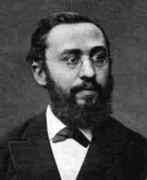Person: Lorentz, Hendrik Antoon

Hendrik Lorentz is best known for his work on electromagnetic radiation and the FitzGerald-Lorentz contraction. He developed the mathematical theory of the electron.
Mathematical Profile (Excerpt):
- Lorentz refined Maxwell's electromagnetic theory in his doctoral thesis The theory of the reflection and refraction of light presented in 1875.
- After retiring from this chair, Lorentz was appointed director of research at the Teyler Institute, Haarlem.
- Before the existence of electrons was proved, Lorentz proposed that light waves were due to oscillations of an electric charge in the atom.
- Lorentz developed his mathematical theory of the electron for which he received the Nobel Prize in 1902.
- The Nobel prize was awarded jointly to Lorentz and Pieter Zeeman, a student of Lorentz.
- Zeeman had verified experimentally Lorentz's theoretical work on atomic structure, demonstrating the effect of a strong magnetic field on the oscillations by measuring the change in the wavelength of the light produced.
- Lorentz is also famed for his work on the FitzGerald-Lorentz contraction, which is a contraction in the length of an object at relativistic speeds.
- Lorentz transformations, which he introduced in 1904, form the basis of Einstein's special theory of relativity.
- Lorentz was chairman of the first Solvay Conference held in Brussels in the autumn of 1911.
- However Lorentz never fully accepted quantum theory and always hoped that it would be possible to incorporate it back into the classical approach.
- Lorentz received a great many honours for his outstanding work.
Born 18 July 1853, Arnhem, Netherlands. Died 4 February 1928, Haarlem, Netherlands.
View full biography at MacTutor
Tags relevant for this person:
Astronomy, Origin Netherlands, Prize Nobel, Physics
Mentioned in:
Parts: 1
Propositions: 2
Thank you to the contributors under CC BY-SA 4.0! 

- Github:
-

- non-Github:
- @J-J-O'Connor
- @E-F-Robertson
References
Adapted from other CC BY-SA 4.0 Sources:
- O’Connor, John J; Robertson, Edmund F: MacTutor History of Mathematics Archive
